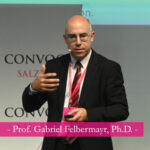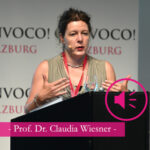



Europe would have a lot to gain if it succeeded in taking a consistent and successful route away from strategic dependency. It only makes sense to follow in the United States’ slipstream in terms of defense policy if it is clear that the United States will ultimately use its military resources to pursue Europe’s goals as well. – Kai A. Konrad –
Recommendations to the EU:
A structural strengthening of our economic competitiveness by means of less expansive social expenditure and more investments in infrastructure and innovation.
An innovation-orientated climate policy: the EU must not engage in de-industrialization. Instead of a CO2 tax which sets a fixed price for emissions and thus overrides market mechanisms, Europe should introduce CO2 budgets and pursue an expansion of the certificate trade.
Security: the development of the common security and defense policy through the creation of joint European armed forces.
The creation of a pan-European public sphere: the establishment of a European media platform and the strengthening of the EU parliament through institutional reforms can help to achieve this goal. – Sven Simon –


Five ideas for the EU Commission:
In a world of systems competition, Europe must ask itself what its own interests are and how it can defend them.
The common market should be expanded.
Monetary union: the Euro should be used as a geostrategic tool with the goal of establishing it as an international reserve currency.
International trade policy: Europe should lead a reform of the WTO to make it greener and more flexible by working with those countries that want to preserve the WTO. Key words: Coalition of the Willing.
New trade regime: we need more bilateral and plurilateral agreements if multilateralism is not possible. – Gabriel Felbermayr –
Europe must continue to push for the principle of reciprocity to be fully and comprehensively implemented in international trade—for instance, European companies in China should have the same opportunities as Chinese companies have in Europe. – Jörg Rocholl –


Europe must avoid being divided by China and others in the areas of investment and human rights. – Parag Khanna –
It is unacceptable to deprive Member States of their scope for taking action and reposition it at European level, where it then cannot be fulfilled through lack of agreement.
However, the EU should speak with one voice on issues of foreign and security policy. – Stefan Korioth –


The EU could act as a pioneer in global regulation, social and occupational safety standards, and the protection of human rights and the environment more powerfully than hitherto, and could play a pioneering role in global democratization.
The EU itself must be democratized. Debating, democratizing, politicizing, and also de-nationalizing (to some extent) are the relevant keywords. The EU must reduce the role of experts, increase legitimacy and transparency, and take the fears of citizens into account. – Claudia Wiesner –
Europe’s core value is democracy. It is important to reinforce this value. Functioning European democracies should strengthen their own democratic structures and support democratic institutions and human rights in those countries that are at risk of autocracy. This also involves the strengthening of and commitment to international institutions that stand for openness, pluralism, and cooperation at a global level. – Corinne M. Flick –


Europe must understand the importance of the integration process for the Western Balkans. The journey is much more important than the arrival, because through the journey we can modernize and possess the know-how that Europe has. – Edi Rama –
In our last Convoco Notes Dr. Roberto Viola and Prof. Jörg Rocholl argued for cutting the EU budget allocation for agricultural policy in favor of research and technologies. The EU has now rejected this proposed cut. We asked MEP Sven Simon for his opinion:
“It is disappointing to see that the decision to allocate 40% of the EU budget to agricultural policy has been made with such a big majority, even though everybody knows it’s the wrong thing to do.”
“We as consumers do not pay a fair price for agricultural products. The sector argues ‘If we do not receive this financial support, how are we supposed to survive?’ The argument is not wrong but it prevents investments in the right areas. To some extent it’s also a problem of democracy itself. Investments in innovation and technologies of the future take years to have an effect. That’s usually not rewarded by the electorate.”
”I am convinced that the EU and its Member States should spend at least 3% of its annual GDP on research and development. That’s approximately the amount allocated by leading knowledge societies such as Israel and South Korea.” – Sven Simon –
Sign up now for exclusive news. We will use your personal information as described in our privacy policy.
© 2024. All Rights Reserved